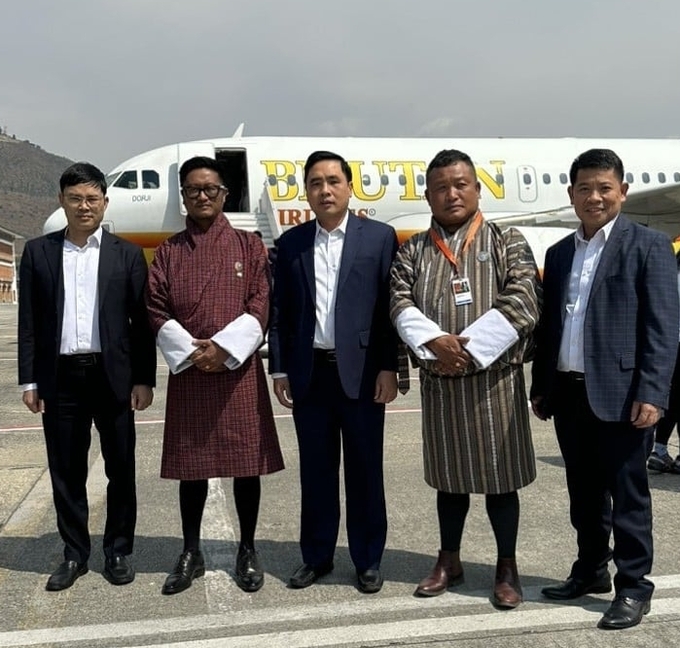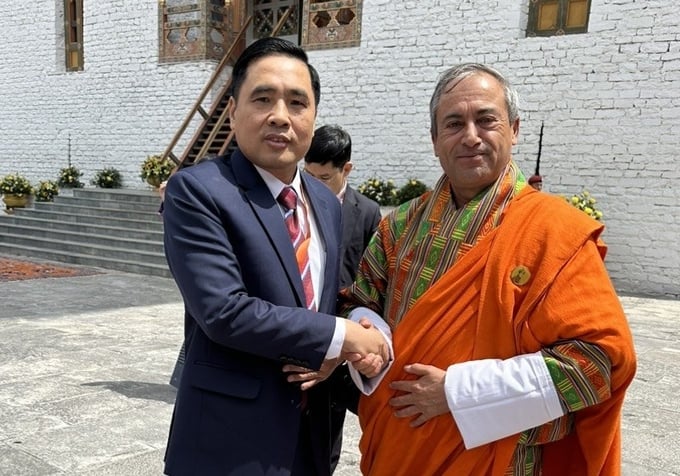May 21, 2025 | 07:37 GMT +7
May 21, 2025 | 07:37 GMT +7
Hotline: 0913.378.918
May 21, 2025 | 07:37 GMT +7
Hotline: 0913.378.918

Representatives of the Royal Government of Bhutan and the Ministry of Foreign Affairs and Foreign Trade welcomed the delegation of the Ministry of Agriculture and Rural Development of Vietnam.
Today, leaders of thirteen tiger range countries, including Vietnam, join together in the “Sustainable Finance for Tiger Landscape” Conference to secure significant international support for a range-wide tiger recovery plan that ties into national and global agendas on climate, biodiversity, and the One Health Programme.
The Conference is hosted by the Royal Government of Bhutan, under the Royal patronage of H.E. the Queen of Bhutan, Jetsun Pema Wangchuck. From Viet Nam’s side, Deputy Minister of Agriculture and Rural Development Nguyen Quoc Tri is joining to discuss with leaders from range countries and international organizations to advance tiger conservation efforts further globally
Tiger is one of the few species that their survival and recovery are so thoroughly intertwined with many of societies’ greatest challenges, including biodiversity decline, development and health concerns. They are deeply embedded in the culture and beliefs of many countries - a symbol of strength, good luck, and power.
But just over a century, the wild tiger population globally suffered a devastating decline, losing around 97% of their historic range. In 2010, their population was approximately 3,200 individuals.
Over the last twelve years, WWF’s Tiger Alive Initiative, was a major force to drive socio-political change for tiger conservation.
Significant progress has been made to conserve this world’s iconic species, with their population globally increased to 4,500 tigers remaining in the wild, in the latest estimation.
However, despite efforts, their habitat continues to decline, limiting them to just less than 3% of their historic range, according to a recent Tiger Conservation Landscape Assessment.

Deputy Minister of Agriculture and Rural Development of Vietnam Nguyen Quoc Tri met with Mr. Lyonpo D. N. Dhungyel, the Minister for Foreign Affairs and External Trade, Royal Government of Bhutan.
Even though tigers have not been recorded in the wild since 2000, Vietnam has issued a ban on trading wild tiger products. Illegal hunting, trading and farming is prosecuted according to the Criminal Code 2017.
In addition, a national action on tiger conservation (2014-2022) was launched to protect the species. However, there are still factors that challenge the impacts of these programs, including the high demand for tiger products, law enforcement capacity, lack of scientific study for tiger landscape recovery, an intricate web of online and offline trading, and tiger captive breeding facilities. These factors have driven our tiger to the brink of extinction.
In his sharing at the Conference, Mr. Tri confirmed the strong commitment of Viet Nam to save the tigers: “Vietnam, together with other countries, are taking actions to protect the species' landscapes, its prey and phasing out tiger farms that are not for conservation targets. We also commit to implementing our country's responsibility for biodiversity conservation in general and tiger in particular, within the framework of CITES conventions, Kunming-Montreal Global Biodiversity Framework to prevent and reverse biodiversity loss and meet the UNDGs.”
Mr. Van Ngoc Thinh, CEO of WWF-Viet Nam, said, “The conference is a great opportunity for Viet Nam to learn from other countries on tiger conservation, especially on tiger reintroduction and captive tiger management; explore potential collaboration; and mobilizing financial resources to replicate successful models shared in the conference. WWF will continue to support Vietnam financially and technically in the rehabilitation of the wild tiger population”
During the three-day conference, Mr. Tri will meet with the highest-level leaders of WWF to discuss the current and future collaboration between WWF and the Ministry. The two sides are keen on working together to gradually phase out tiger facilities with no conservation objectives and build the Central Annamites as a landscape model that can replicate the Bhutan for Life program in Vietnam as Vietnam for Life.
The conference is supported by the Tiger Conversation Coalition which includes several leading conservation organizations including the Environmental Investigation Agency (EIA), Fauna & Flora International (FFI), International Union for Conservation of Nature (IUCN), Natural State, Panthera, TRAFFIC, United Nations Development Programme (UNDP), Wildlife Conservation Society (WCS), World Wide Fund for Nature (WWF), and the Zoological Society of London (ZSL). It hopes to push for a renewed focus on tiger conservation, seeking greater financial commitments from the global community to ramp up conservation efforts significantly beyond just tiger recovery.
Translated by Huong Giang

(VAN) In 2024, over 295 million people across 53 countries and territories faced acute hunger—an increase of almost 14 million people compared to 2023, while the number of people facing catastrophic levels of hunger reached a record high.

(VAN) World Environment Day 2025 (June 5) carries the theme 'Beat Plastic Pollution' continuing to emphasize the global urgency of addressing the plastic waste crisis.

(VAN) This was the assessment shared by experts at the workshop titled 'Assessing the Role and Potential of Low-Emission Rice Production Systems in Vietnam,' held on the morning of May 19.

(VAN) Cai Rong Port is the fisheries control center of Quang Ninh, helping to monitor fishing vessels, combat IUU fishing, and remove the EC's 'yellow card'.

(VAN) The German Agricultural Society (DLG) explores the possibility of establishing a mechanization service center in Vietnam’s Mekong Delta to support farmers in accessing and utilizing advanced machinery.

(VAN) On May 16, the Department of Water Resources Management, in collaboration with the Food and Agriculture Organization of the United Nations (FAO), held a signing ceremony for the GEF-8 project document.

(VAN) Food safety, mechanization, vocational training, and market opening are key areas of cooperation expected between the Vietnamese Government and the Federal Republic of Germany.